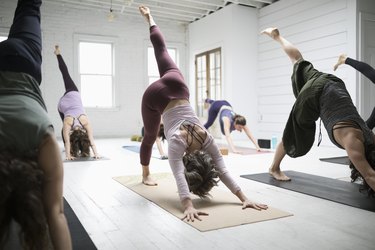
Fitness newbie or not, if you're always feeling tired from exercise, you're probably wondering why something that is supposed to give you energy is dragging you down. Exercise exhaustion can happen for a lot of reasons including lack of nutrients, certain medical conditions and overtraining. Pinpointing the exact cause of your fatigue may take some trial and error, but it's worth figuring out why your workouts aren't working for you.
Tip
A healthy amount of physical activity should not make you feel tired all the time. If you're experiencing exercise fatigue, take inventory of your sleep and eating habits.
Video of the Day
Can Exercise Cause Fatigue?
One particular health condition that may make you feel tired from exercise is exercise-induced anemia, which main symptom is extreme fatigue. Other red flags include a decrease in endurance, increase in heart rate and frequent dizziness.
Video of the Day
Exercise-induced anemia can happen when competitive athletes or people who participate in chronic intense physical activities display low hematological values which results from decreased iron stores. Plus, if you're a menstruating female, exercise-induced anemia can get worse, especially during your cycle when blood loss is at its highest.
Other medical conditions that may lead to exercise exhaustion include diabetes, fibromyalgia, chronic fatigue syndrome, multiple sclerosis and chronic obstructive pulmonary disease. If you have any one of these chronic health issues, and you're experiencing exercise fatigue, talk with your doctor about safe ways to include physical activity into your day.
If you're new to exercise or you've recently upped your game, you may experience a short bout of exercise exhaustion. However, this should subside as your body gets used to an increase in physical activity.
Too Much Exercise
It's well-known that getting zero physical activity can cause you to feel sluggish. But did you know that getting too much exercise can also make you tired? Overtraining happens when you neglect to give yourself enough rest between workouts, especially sessions that you perform at a high intensity.
Some symptoms of overtraining include feeling tired, being unable to perform at the same level, moodiness, trouble sleeping, feeling sore more than normal and losing weight and strength. Adequate rest between workouts can help reduce the effects of overtraining. Aim to include a recovery day every three days.
Foods That Make You Tired
Your diet plays a significant role in your energy levels both during exercise and throughout the day. While no one food is known to make you tired, you can experience exercise fatigue if you're not getting enough key nutrients. In order to maintain energy levels while working out, you need to fuel your body with carbohydrates, protein and healthy fats.
Carbohydrates such as whole-grain cereals, oats, fruit, rice and pasta are your body's preferred source of energy while protein helps aid in recovery and supports muscle growth. Healthy fats such as avocado, nuts and almond butter pack more calories than carbs and protein and can help keep you full longer.
Read more: How Long After You Eat Can You Work Out?
Energy From Working Out
If you're in good health and not dealing with any chronic conditions that cause fatigue, then a decent amount of exercise should give you energy, not make you tired. When your heart and lungs are working at normal capacity, you feel more energetic. Exercise facilitates this by delivering oxygen and nutrients to your tissues which allows your cardiovascular system to work efficiently.
For substantial health benefits, the U.S. Department of Health and Human Services recommends that adults get a minimum of 150 minutes a week of moderate-intensity or 75 minutes a week of vigorous-intensity aerobic activity. Additionally, you'll want to include two or more days of muscle-strengthening exercises that involve all major muscle groups.
- Mayo Clinic: Exercise: 7 Benefits of Regular Physical Activity
- British Journal of General Practice: Exercise-Induced Anaemia: A Forgotten Cause of IRON Deficiency Anaemia in Young Adults
- MedlinePlus: Are You Getting Too Much Exercise?
- American Heart Association: Does Exercising Cause You to Be Tired All the Time?
- The American College of Sports Medicine: Everyday Nutrition vs. Performance Nutrition
- Mayo Clinic: Fatigue
- U.S. Department of Health and Human Services: Physical Activity Guidelines